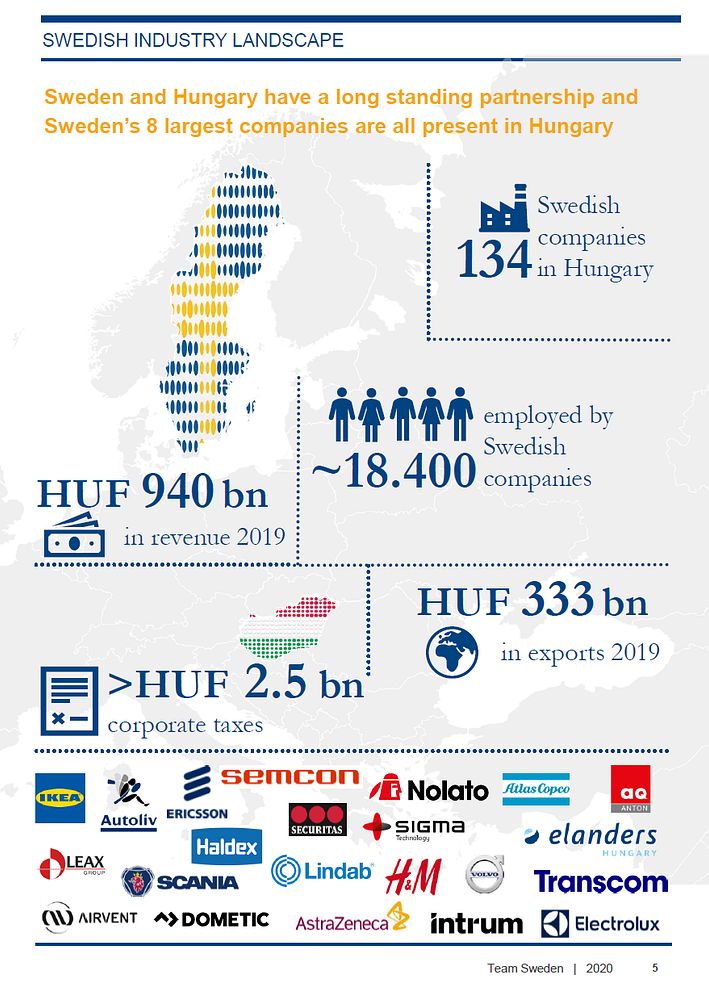Thomas Straumits. Photo credit: Tamás Kovács
The Swedish Chamber of Commerce in Hungary (SCCH) aims to expand economic and commercial relations between Sweden and Hungary. Today, there are over 130 Swedish companies employing Hungarian talent and investing in the country. Many of these organizations are members of SCCH, including Volvo, Electrolux, Ericsson, ABB, and Sigma Technology, among others. Thomas Straumits is a newly elected President of the Chamber, and he is optimistic about developing cooperation between these two European countries.
Thomas, would you like to tell us a little bit about yourself and your role at the Swedish Chamber of Commerce in Hungary?
I am a Swedish citizen who graduated with a Master of Sciences in Pharmacy from Uppsala University in 1993. Life and work across seven countries have given me a broad experience, a global perspective on business, and real-life demonstration of the strength of collaboration and partnerships, which can come in various shapes and forms in the most unexpected places. I moved to Hungary with my family in 2014 to work as a CEO for a subsidiary of a multinational research-based biopharmaceutical company, MSD. I joined the Chamber the same year and have supported it as a Supervisory Board member in the past years.
I would like to say that I am very proud and humble for the members’ trust to nominate and vote for me to serve the community as their President. The organization has a long history and a great mix of new and old Board members; we want to leverage our great heritage while ensuring that we adapt the organization to the future. Building strong partnerships and expanding our networks are important components of what we want to do.
SCCH was established in 1995 in response to the expanding economic and commercial relations between Sweden and Hungary. What is the SCCH’s mission today?
In some ways, this has not changed. We are here to represent the interest of Swedish companies in Hungary and ensure that our values and investments are well recognized. Our “Team Sweden” is a strong and diverse community of around 130 Swedish companies employing almost 20,000 citizens. Sweden remains in the top 15 countries of Foreign Direct Investments and one of the global leaders in innovation and sustainability. The SCCH member-companies would like to offer our support and expertise to the government, thereby creating a strong partnership to shape the local business environment for the benefit of Hungary.
Over the years, we have seen a change in the overall industrial landscape where “production or manufacturing” have been complemented with industries that are leading in technology, data, knowledge, and innovation. This transformation is a significant development and provides multiple opportunities for collaboration with ministries, governmental bodies as well as the exploding landscape of small and midsize enterprises (SMEs). This makes our mission even more relevant today and being able to connect the two countries would bring a lot of value to both parties.
How would you describe the business and economic environment in Hungary?
Hungary has been one of the fastest-growing economies in the EU and over the past years, it has reduced the corporate income tax to 9% in order to ensure competitiveness in the labor market. There has also been an active shift from “made in Hungary” to “invented in Hungary” as a way to broaden its base of industry sectors providing jobs, but also important growth to the country. Almost 2/3 of the working population (2018) are employed in services and about 20% in manufacturing. With a central location in the EU, easy access to surrounding countries, and reasonable labor cost, multiple industries have made decisions to locate their businesses in Hungary like R&D, production, and service/logistics centers. We can see that Swedish companies are well-positioned in their respective sectors and are continuing to grow their presence and revenues here.
Even though we operate in Hungary, we know that the Swedish company culture, built on fairness, equal treatment, and other values, is well perceived by employees, which enables an attractive proposition on the labor market. These are also important guiding principles and expectations for our companies in the local market.
What are your primary goals and focus areas for SCCH during your presidency? What will be the main tasks of the new management of the chamber?
One key strength of our Chamber is a wide range and size of industries and sectors that we are representing, ranging from Business-to-Business (B2B) to full reliance on Business-to-Customer (B2C) models. Our members provided feedback on the future direction of the Chamber, and we will work together with them to evolve the visibility, support, engagement, and expansion of the Swedish business community as our primary goal. We need to ensure a strong partnership with the Swedish Embassy, Business Sweden, the Nordic business community but also with multiple ministries and governmental bodies. There could be interactions with universities, the public sector, SMEs, and NGOs in some projects.
The Swedish values is a strong glue in our community, and role modeling the “Swedishness” could be an important platform where we can share and evolve our knowledge, best practices, and learnings with our members, but also include the larger business community. Further evolving the visibility, communication platforms and network with a business focus is another important aspect of our work. It will be very exciting!

Swedish Chamber of Commerce in Hungary, board meeting at Sigma Technology Hungary. Photo credit: Tamás Kovács
What do you think makes Sweden and Hungary great business partners?
Swedish companies have been investing here for more than 100 years, and today all eight of the largest Swedish companies have a presence in Hungary. In many ways, there are great synergies between the countries to explore, and possible explanations of the great partnership include efforts of Hungary to retain and improve its level of competitiveness for future investments, the desire from both sides to move towards more value-adding activities, and employment of higher-skilled workforce, but also investments in technology to drive automation and robotization. The digital infrastructure in general is rapidly evolving, which is opening up opportunities for innovative ways to increase customer experience for companies working directly with a broad base of consumers in the retail industry.
A central location within the EU and easy access to other markets are also important factors for our companies. Many of them are world-leading within their sectors and seeking to provide reliable and stable partnerships with a strong focus on value add and sustainability. These are foundations for a great match and our ambition is to continue to explore and evolve for the future.

“Hungarian-Swedish Partnerships for Generations” study prepared by the Embassy of Sweden & Business Sweden
Many Swedish companies that are also members of SCCH (such as Ericsson, Volvo, IKEA, Electrolux, Sigma) are active drivers of developing the Hungarian business landscape and increasing the attractiveness of the country on a global level. Why do you think it is so important?
We are very happy to see these leading Swedish companies being so engaged both in the activities of the Chamber, but also in driving evolution/disruption of the overall Hungarian business landscape. They all bring international experience and the ability to leverage best practices here, and their reputation, brands, and services carry a long way in the dialogue with decision makers and stakeholders. They represent a diversity of sectors important for the long term growth of the economy of Hungary and are willing to expand their partnership here, but more importantly, they are able to connect partners across the globe, which tie business opportunities and countries even closer to each other. In a way, they serve as ambassadors of great innovative partnerships, building on trust which is one of the cornerstones of “Swedishness”. The Chamber will continue to support great partnerships within our own group but also advocate for the value we can bring to others.
How has the outbreak of the coronavirus influenced the operations of SCCH?
Similarly to other organizations and companies, the operations of the Chamber have been impacted by COVID-19. With restrictions imposed by the government, personal meetings were impossible to initiate, and we have had to postpone them or conduct via electronic means. We have to ensure that we leverage the learnings but also capitalize on the greatly advanced acceptance of digitalization and virtual events.
It is important to note that many of our member companies were greatly impacted by the coronavirus. Some of them were forced to temporarily close their retail stores, while others were able to continue their work albeit not at the pace or intensity that they had prior to the pandemic. However, it was also great to see our companies volunteering in these difficult times, demonstrating strong support to the community in which we operate.
We wish Thomas Straumits good luck in his new position and thank him for the interview.
György Nagy, Country Manager at Sigma Technology Hungary, was a Member of the SCCH Management Board between 2013-2018, and now steps into the role of SCCH Treasurer/Head of Finance for 2020-2022:
“The Swedish Chamber of Commerce in Hungary is an important enabler of partnership and cooperation between businesses and organizations in Hungary. The Scandinavian corporate culture is a great model for us to do business in Hungary in a way that is both transparent and profitable. Over the years, Sigma Technology Hungary has been honored to support the Swedish Chamber of Commerce, the Embassy of Sweden in Hungary, and Business Sweden in bringing many business, social, and cultural initiatives to life. It feels good to join the Chamber Board again, and I am looking forward to working toward our common values together with the representatives of other Swedish businesses.”
For more information about the Swedish Chamber of Commerce in Hungary, visit www.swedishchamber.hu.
